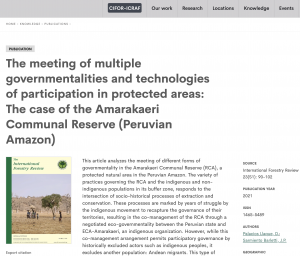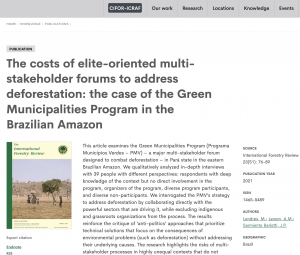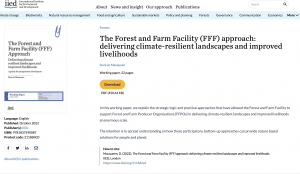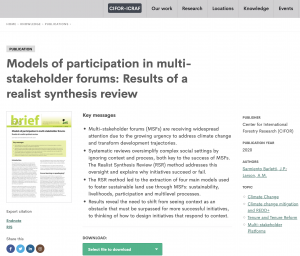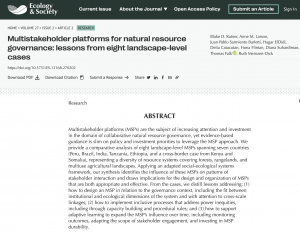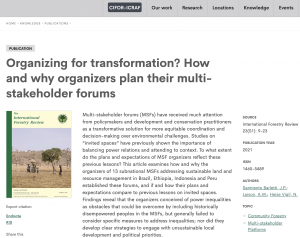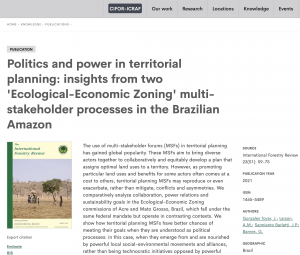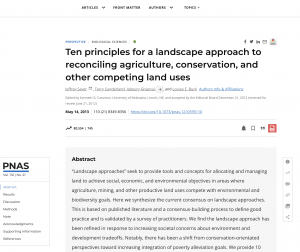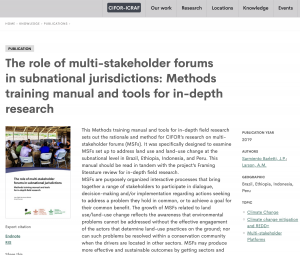Category: Knowledge
The meeting of multiple governmentalities and technologies of participation in protected areas: The case of the Amarakaeri Communal Reserve (Peruvian Amazon)
This article analyzes the co-management of the Amarakaeri Communal Reserve (RCA) in the Peruvian Amazon, highlighting the intersection of socio-historical processes and the exclusion of Andean migrants from participatory governance. It raises questions about the inclusivity of multi-stakeholder forums in protected area governance.
The costs of elite-oriented multi-stakeholder forums to address deforestation: the case of the Green Municipalities Program in the Brazilian Amazon
This article examines the Green Municipalities Program (PMV) in Pará state, Brazil, a multi-stakeholder forum aimed at combating deforestation. Through qualitative analysis of in-depth interviews, it critiques the program's strategy of collaborating with powerful sectors while excluding indigenous and grassroots organizations. The research highlights the limitations of "anti-politics" approaches that fail to address underlying causes of environmental problems and raises concerns about the legitimacy of initiatives perceived as unjust in unequal contexts.
The Forest and Farm Facility (FFF) approach: delivering climate-resilient landscapes and improved livelihoods
This working paper highlights the Forest and Farm Facility's strategies and practical approaches in supporting FFPOs for climate-resilient landscapes and improved livelihoods. It emphasizes the potential of participatory, bottom-up approaches as nature-based solutions for people and the planet.
Models of participation in multi-stakeholder forums: Results of a realist synthesis review
Context and process are both vital for a MSF to succeed, but at times they can be ignored. This review shows that the more successful MSFs view context not as an obstacle, but instead design their initiatives to respond to it.
Multistakeholder platforms for natural resource governance: lessons from eight landscape-level cases
A comparative analysis of eight landscape-level multistakeholder platforms (MSPs) across seven countries, examining their influence on stakeholder interactions and offering insights for effective MSP design and organization. Lessons learned include the importance of aligning MSPs with the governance context, promoting inclusive processes to address power inequities, and supporting adaptive learning for long-term impact through outcome monitoring, expanded stakeholder engagement, and investment in MSP durability.
Organizing for transformation? How and why organizers plan their multi-stakeholder forums
This article investigates the alignment of multi-stakeholder forum (MSF) organizers' plans and expectations with previous lessons on "invited spaces" regarding power relations and contextual considerations. Analysing 13 subnational MSFs in Brazil, Ethiopia, Indonesia, and Peru, the study reveals that while organizers aimed to include historically disempowered groups, they often overlooked addressing power inequalities and lacked strategies to engage with unsustainable local development and political priorities.
Politics and power in territorial planning: insights from two ‘Ecological-Economic Zoning’ multi-stakeholder processes in the Brazilian Amazon
Multi-stakeholder forums (MSFs) in territorial planning aim to foster collaborative and equitable land use development. However, conflicts and asymmetries can arise, potentially exacerbating existing issues. Through a comparative analysis of Ecological-Economic Zoning commissions in Acre and Mato Grosso, Brazil, this paper demonstrates that viewing MSFs as political processes rooted in powerful local social-environmental movements and alliances increases their effectiveness in achieving sustainability goals, as opposed to facing opposition from production-business alliances.
Ten principles for a landscape approach to reconciling agriculture, conservation, and other competing land uses
This article synthesizes the consensus on landscape approaches, highlighting their role in balancing competing land uses and achieving social, economic, and environmental objectives. The study provides 10 principles for implementation, emphasizing adaptive management, stakeholder involvement, and multiple objectives, while acknowledging institutional and governance constraints. It argues that landscape approaches are among the most effective strategies for addressing complex landscape challenges.
Understanding Difference to Build Bridges among Stakeholders
Perceptions of Participation in Four Multi-stakeholder Forums in the Peruvian Amazon
The role of multi-stakeholder forums in subnational jurisdictions: Methods training manual and tools for in-depth research
CIFOR's Methods Training Manual for in-depth field research examines multi-stakeholder forums (MSFs) addressing land use in Brazil, Ethiopia, Indonesia, and Peru. It highlights the potential and pitfalls of MSFs, emphasizing the need for genuine participation. This timely research aims to contribute empirically to understanding MSFs and their role in addressing climate change and development trajectories.


